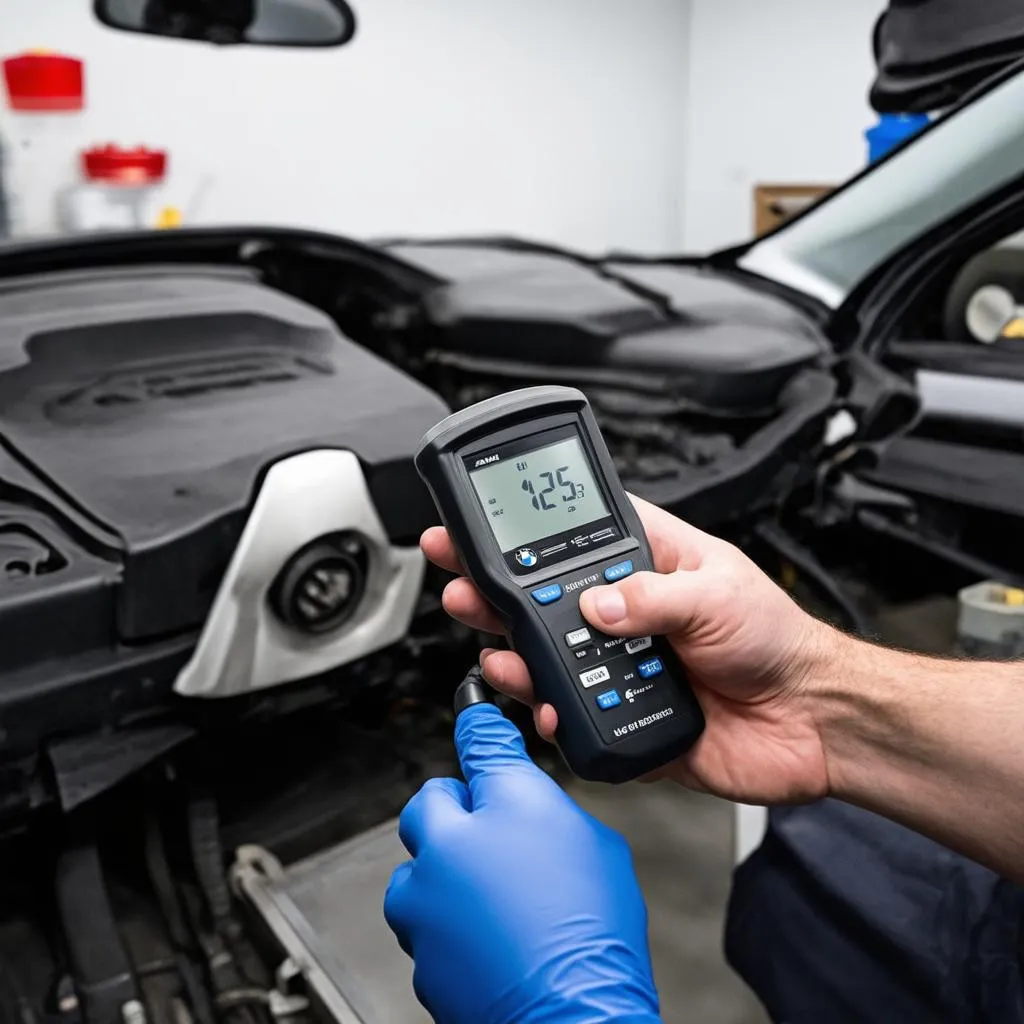“Was that a slight cough from my engine? And what’s that flickering light on the dashboard? C’mon, not today!” If you drive a BMW, especially an older model, and you’ve had this mini heart attack, you know the feeling. The culprit? Often, it’s that ominous “Service Engine Soon” light, and lurking behind it might be the dreaded OBD code P0125. But before you envision dollar signs and workshop chaos, let’s demystify this code and see what it really means for you and your beloved Bimmer.
P0125: A Cocktail of Engine Coolant and Electronics
In simple terms, the P0125 code signals that your car’s Engine Control Module (ECM), the brain behind your engine’s performance, isn’t getting the right information about your engine’s temperature. It’s like the ECM is trying to bake a cake but can’t tell if the oven is at 350°F or just warming up.
Now, where does the “cocktail” come in? Well, this code usually pops up when the engine coolant temperature (ECT) sensor, responsible for monitoring the engine’s heat, isn’t playing ball. The ECT sensor is vital because it helps the ECM adjust the fuel-air mixture and ignition timing for optimal performance and fuel efficiency.
Imagine your BMW is like a high-strung athlete; it needs to maintain a specific temperature range for peak performance. The ECT sensor is like the coach, constantly monitoring and relaying information to the ECM to keep everything running smoothly.
Why Does It Matter?
You might think, “So what if my car takes a while to warm up?”. Well, a faulty ECT sensor and a lingering P0125 code can lead to:
- Poor fuel economy: Just like a car stuck in first gear burns more fuel, an engine running too cool or rich (due to incorrect data) guzzles more gas.
- Increased emissions: An inefficiently running engine spews out more harmful pollutants, impacting the environment.
- Sluggish performance: Remember that athlete analogy? A cold engine might hesitate, stall, or lack its usual zip.
- Potential engine damage (in extreme cases): If the engine overheats due to faulty temperature readings, it can lead to costly repairs.
What Can Cause the P0125 Code?
Besides a faulty ECT sensor, other culprits could be brewing under the hood, including:
- Low engine coolant level: Just like a dehydrated athlete can’t perform, your engine needs sufficient coolant to maintain its cool.
- Faulty thermostat: The thermostat regulates the flow of coolant through the engine. A stuck thermostat can disrupt the temperature balance.
- Wiring problems: Imagine a bad connection in your home’s electrical system; similar issues with the wiring to the ECT sensor can disrupt the flow of information.
So, You See the P0125 – What Next?
Don’t panic! The appearance of this code doesn’t necessarily mean a complete engine overhaul. However, ignoring it is like ignoring a growing crack in your windshield; it’s best to address it sooner than later.
- Check your coolant: Pop the hood (when the engine is cold!) and check the coolant reservoir. If it’s low, top it up with the recommended coolant type for your BMW model.
- Schedule a diagnosis: While a DIY coolant top-up might do the trick, it’s best to get a professional diagnosis. A mechanic can use a dealer-level scanner, especially for European cars like BMWs, to pinpoint the exact cause of the P0125 code.
 BMW Mechanic
BMW Mechanic
Beyond the Code: The Human Touch
Remember, technology like OBD scanners is a tool, but it’s the mechanic’s experience and understanding of your BMW’s intricacies that truly matter. As renowned automotive engineer Dr. Markus Kohler once said, “A car is more than just nuts and bolts; it’s a symphony of systems working together.”
A Holistic Approach: Feng Shui and Your BMW
Interestingly, the concept of balance resonating in your car’s engine finds a parallel in the ancient Chinese practice of Feng Shui. Just as a harmonious flow of energy is essential for well-being in your home, so too is a balanced flow of coolant and accurate information crucial for your BMW’s health. A well-maintained car, like a well-balanced living space, can contribute to a smoother, more enjoyable journey.
Frequently Asked Questions
Here are some common questions BMW owners have about the P0125 code:
Q: Can I still drive my BMW with the P0125 code?
A: While you might be able to drive for a short distance, it’s not recommended. Continuing to drive with a potential engine issue can worsen the problem and lead to more extensive (and expensive) repairs down the road.
Q: How much does it cost to fix the P0125 code?
A: The cost can vary depending on the actual cause and the complexity of the repair. A simple coolant top-up might be inexpensive, while replacing a faulty ECT sensor or thermostat can range from a few hundred dollars to more, especially for European cars.
Q: Can I fix the P0125 code myself?
A: If you’re mechanically inclined and comfortable working on your car, you might be able to tackle some of the simpler potential fixes, like topping up the coolant. However, for accurate diagnosis and repair, it’s always best to consult a qualified mechanic, especially one specializing in BMWs.
Other Codes to Watch Out For
While the P0125 code is common, other codes related to your BMW’s engine performance might pop up. Some of these include:
- P0101: Mass Air Flow (MAF) Circuit Range/Performance Problem
- P0171: System Too Lean (Bank 1)
- P0300: Random/Multiple Cylinder Misfire Detected
- P1554: BMW Specific Code Related to Throttle Position Sensor (You can learn more about this code in our article on BMW OBD Code P1554)
Remember, each code signifies a different issue, so consult your mechanic or a reliable online resource like techcarusa.com for specific information.
Need Help Decoding Your BMW’s Cryptic Messages?
Is your BMW throwing you a curveball with the P0125 code or any other automotive puzzle? Don’t sweat it! Our team of expert mechanics is just a message away. We offer 24/7 support and can help you decipher those confusing codes, diagnose the problem, and get your Bimmer back on the road in its prime. Contact us on WhatsApp at +84767531508, and let’s get your car back in top shape!
 BMW on the Road
BMW on the Road
Keep Your BMW Happy, Keep Yourself Happy
In conclusion, the dreaded P0125 code, while a cause for attention, is not a reason to panic. By understanding what it means, taking prompt action, and seeking professional help when needed, you can ensure your BMW stays in peak condition, ready to deliver the performance and driving pleasure it’s known for. Remember, a happy BMW means a happy driver!